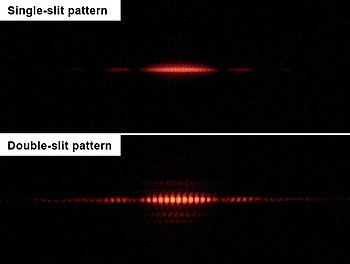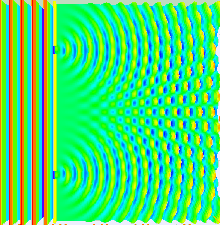I believe that the scientific peg can easily fit into the spiritual space, at the end of the day Hindus as well as other people will accept its truth. Can you have the consciousness of an electrons, or even further, that of a quark, lepton, gauge Boson, or Higgs Boson? Brahman is something even beyond these. Therefore, we can never have the consciousness of Brahman. What we have is the consciousness to the limits of our brain, human consciousness. We will have to do with that. The difference between the two is too enormous to be bridged. Kindly give me one reason why should I drop Vedanta or Advaita when I believe in one eternal constituting all things in the universe?
Well, unlike atanu (and with respect to his and other advaitin's pleas,) I'm not necessarily requesting you to stop identifying as an advaitin if it's your prerogative not to, but rather to take into consideration that the way you are using popular advaita related terms (such as 'Brahman') is not in accordance with the way other people are using those terms, and so there is always going to be a confusion about the meaning of terms whenever you and any other advaitin are going to be posting in the same thread on the same topic. The risk here is that we are going to utterly confuse anybody sincerely asking questions about advaita since there's going to be very divergent answers using the same terms. To illustrate my point, look at what you said here:
Therefore, we can never have the consciousness of Brahman. What we have is the consciousness to the limits of our brain, human consciousness. We will have to do with that. The difference between the two is too enormous to be bridged.
The implication here is that there is a thing called human consciousness, which is (an emergent, transient property of the human brain?) subjective, limited and different (read: irreconcilable) from another thing called Brahman consciousness, which, if I speak rightly, you identify as an objective and eternal physical reality, which is either the sum total of all physical objects and energy, or an energetic substance underlying all of the other objects and energy (I'm not sure which you subscribe to). Either way, the point is that you are saying human consciousness is different from Brahman, and the latter is not to be understood, in a final analysis, as identical with the former. The problem here is that this demonstrably is not taught in either modern or traditional interpretations of Advaita. To put it in another way, and do forgive/correct me if I put the wrong words in your mouth;
Aupmanyav
Atheistic
Empirical science (measurement of objects) is the way to gain knowledge of reality.
The self of the individual is an emergent property of a brain, is a limited human consciousness and cannot (as current empirical science stands) know Brahman, and Brahman is an objective reality 'out there' in the same category as things like gravity, atoms, string field, etc
Other advaitin
Theistic
Accepts the limitations of sensory perception and inference as pramAnas, and accepts Vedic texts as an independent pramAna. Further, Brahman (Reality) is not viewed as an object that can be detected or measured by any empirical measurement or instrument.
The Self of the individual, though seemingly limited by a body and mind, is on closer inspection seen to be not a transient (or even transmigrating) limited individuality but none other than the ultimate reality itself.
Brahman is not some physical force 'out there' that is
just below or outside the range of scientific detection, but is rather the very consciousness within all, which illuminates all minds, animates all bodies, and is the existence on which all the names and forms of the universe depend. It is not outside of yourself, nor is it unattainable as a recognition that it is your very nature, or that it can be known. Brahman can be known, though not as an object- not under a microscope, but as the content and nature of the subject, 'I'.
This is a very quick and rushed summary of just a few differences between (my understanding of) your views and the views of other advaitins. You say you acknowledge the idea that there is an eternal reality that constitutes all things in the universe. Now that's fine, but that's (maybe) about the only similarity your views share with Advaita Vedanta commonly understood. It's a very loose connection, and there are seemingly many more differences than commonalities. It seems to be Advaita in name only. Therefore, surely for your own benefit
and to save many topics from confusion it'd be easier to identify yourself as a
monist, which, in short, can apply to anybody who subscribes to the notion that there is ultimately only one reality- be it a physical or spiritual reality. A monist can be an atheist, a materialist, and a reductionist. But can an atheist, a materialist, and a reductionist be a vedantin, even though he says there is only one reality? I'm not convinced. Not without ignoring vast swathes of texts, teachings, and teachers, traditional or modern, which reject your views, or assert the opposite. I don't think other members of this forum who self-identify as advaitin/vedantin are convinced, either. You have to selectively read the source materials and the source teachings. Did you read the sixth chapter of the chAndogya that I mentioned in my last post? In there it says that
you, ie the seemingly limited human consciousness, are really
that reality behind everything which exists, and upon which everything depends for its existence. In other words,
you are Brahman. Therefore, how can you say that the difference between you and Brahman is a difference ''too enormous to be bridged''? This knowledge is possible, it is attainable- the very aim of the Upanishads is to teach this knowledge and to say,
look! look what you really are! You have to either willfully ignore or be merely ignorant of such teachings to say otherwise, in my opinion. What do you think? What is the content of the statement
tat tvam asi in your view, if the individual and the objective Reality be unbridgeable? Is it a meaningless statement? Is it twaddle? Superstitious thinking? The mistakes of well meaning sages in light of scientific advancement? Which ideas of Advaita Vedanta
do you subscribe to, other than the aforementioned monism?
Apologies if this post is a bit garbled and difficult to read- I'm feeling rather sleepy.


